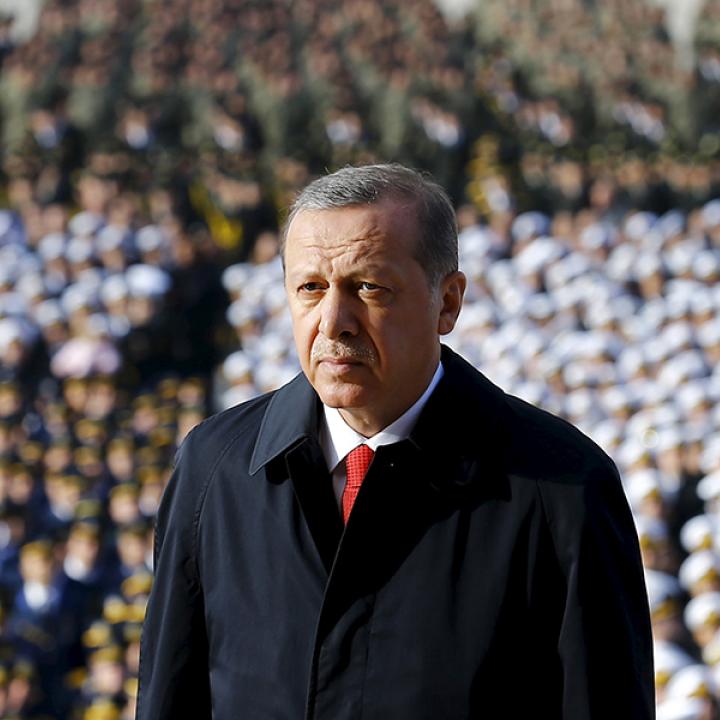

Although continuing the crackdown would be the quicker and more expedient approach to meeting Erdogan's goals, it is also more dangerous, risking a permanent state of cultural civil war.
Some two months after the attempted overthrow of its government by rogue military commanders, Turkey faces a choice in its political development. Had the coup succeeded, the country would probably have plunged into civil war. But a popular uprising, urged on via a FaceTime video by President Recep Tayyip Erdogan, overcame the revolt in its first few hours. The quashing of the putschists generated a rare sense of unity among Turks.
Mr Erdogan, who leads the conservative Justice and Development Party and has been in power since 2003 as prime minister and then president, emerged the winner of the night, with a big increase in both his personal power and popularity. Having put in place a three-month, post-coup state of emergency, his popular support increased from a usual 40-50 per cent to 68 per cent in one Turkish poll.
On the international front, Mr Erdogan has recently patched up relations with Israel and Russia -- damaged respectively after Israel's raid on the Gaza aid flotilla in 2010 and the shooting down of the Russian military plane in 2015. He has supported moves towards reunification of Cyprus and intervened on the ground in Syria to deter all three of Ankara's foes there -- Isis, the Assad regime and the Syrian Kurdish Democratic Union Party (PYD). While the PYD is allied with the US against Isis, it is also closely linked to the Turkish Kurdistan Workers' Party (PKK), which has led insurgencies in Turkey and is considered a terrorist group by Ankara and the US. The refugee deal so critical to Europe is holding and the Turkish economy, while slowing, is on an even keel.
The main beneficiary has been Mr Erdogan himself. He can choose between two futures: one oriented towards his popularity, the other towards his power. His choice will shape Turkey and the entire south-east European and Middle Eastern regions.
Opting for popularity -- and the political security that sustained popular support brings -- could result in a return to Mr Erdogan's reformist early years as prime minister. It might signify more of the kind of overtures to PKK rebels he made before 2015. It could also mean less of a "winner-take-all" spirit in dealing with his political opposition and a curtailment of extrajudicial hounding of alleged supporters of the Islamist cleric Fethullah Gulen, who most Turks now believe masterminded the coup. Such an approach could advance Mr Erdogan's aim to create a "presidential state" -- gaining, through constitutional amendments, enhanced powers similar to those of a French president.
The second way, however, to achieve this ambition is through the exploitation of his post-coup power over state and society, a level of control unseen in Turkey since the Republic's founder, Mustafa Kemal Ataturk. No institution -- neither the army, the Gulenists, the media, the political opposition nor the judiciary -- can now halt a move towards a democratically sanctioned, de facto dictatorship.
In this context, Mr Erdogan could expand the fight against the PKK, extend the state of emergency and ban parliamentarians from the pro-Kurdish Democratic People's Party. He could obtain the parliamentary super majority he needs to amend the constitution through an alliance with the strongly nationalist, anti-Kurd Nationalist Action Party.
This path is the quicker and more expedient. It is also more dangerous, pitting Turkey's Kurds, Alevis (a large heterogeneous Shia minority) and west-oriented "secularists" against Mr Erdogan's nationalist religious alliance in a permanent cultural civil war. Vladimir Putin's leadership is the model here but Russia has fewer cultural divisions. In the long term, Turkey cannot prosper in an integrated global economy while it is in the midst of a cultural and political civil war with ever more restrictions on liberty.
The west has a stake, given Turkey's geopolitical importance and the disorder in the region. The west also has leverage but it is limited. With Syria burning and new refugee flows looming, Europe and the US need Mr Erdogan now as much as he needs them. And he reacts notoriously badly to pressure from the outside.
Nevertheless, finding common ground with Turkey on security, diplomatic and economic issues eventually could build trust of the kind that existed between Mr Erdogan and Barack Obama during the US president's first term.
That is no guarantee of a gentler Mr Erdogan. But he will want to hedge his bets; flaunting a proud independence from the west without burning bridges to it. The right approach by the west could help him find such a middle path. It could include better co-ordination between Washington and Ankara on operations in Syria, a good faith US response to the request for Mr Gulen's extradition and EU adherence to the refugee accord.
James Jeffrey is the Philip Solondz Distinguished Fellow at The Washington Institute and former US ambassador to Turkey.
Financial Times



